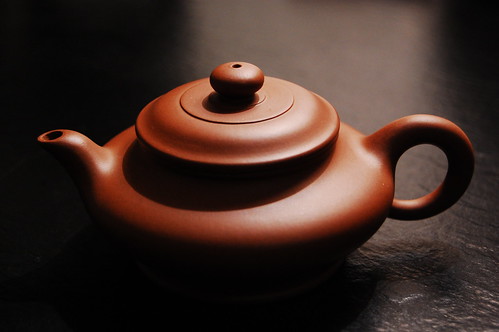
I wrote this in response to Hobbes' recent post in which he gives humble words, which I will summarize as a suggestion to take his reviews with a grain of salt, and to sample teas for oneself to find what the truth of a tea is for you. It is a nice perspective, very humble.
It really is amazing how different people can experience the same teas in entirely different ways. "Oh, you must have brewed it too long," the pretentious will say. But is it really so simple as determining brewing factors?

To analogize with food, two people can taste the same thing, for example cheese, or even fish. While these two people are consuming identical substances, the ways they perceive those tastes differ. They can differ so greatly as to reflect one person's disgust at the taste of cheese or fish, while the other person adores the tastes. If people can have opposite perceptions of a taste, then can there not be a middle route where, for example, certain tastes in a tea might fluctuate between wood and tobacco depending on the person?
The most interesting thing I've found in my tastings is that I can often find a note of something in a tea if I simply look for it: tobacco or woodsiness in a sheng, leather or pondiness in a shu, melon in a sencha. My greatest tool is to hunt for these flavors for which I already associate with a certain kind of tea, then find the degree to which they are present. When I put into words this style of analysis, I say things like: "Wet lumber covered by a cloud of must, with a low note of swamp in the distance." It is very hard to clearly deliver these perceptions through words. This varying "presentness" of flavors is more ideal for numerical percentages (ex. 60% fresh lumber, 30% pond, 5% cinnamon, 5% chemical), but being so hard to quantify accurately in such a way, I stick to the words.

Accurately describing sensations for people to understand is no walk in the park. I hope this post has helped to show some of the problems, and will cause you to look at the tasting notes of myself and others as extremely subjective perceptions.
Wes


3 comments:
Wesli,
You are either getting funnier or crazier. I can't tell which.
I have to admit that it does seem somehow wrong that our vocabulary about taste and aroma relies so heavily on analogies, that there really aren't many straightforward terms like astringent or bitter or sour.
The same issues arise with scents, but perfumeurs seem at least to have a large inventory of scent memories to refer to. And then there's the whole issue of personal history as it relates to scent and taste, what something reminds us of.
Well, maybe it's not just you. Maybe we are all getting crazier ... or (I hope) funnier.
Sal
Once talked to a psychology professor who was famous for his research on how people speak in analogies and metaphors during therapy to describe the way the feel. If a person doesn't have the vocabulary to describe something complex that person will use figures of speech to compensate. We who post about tea are just not satisfied at quantifying the experience with tea, thereby simplifying it and minimalizing it. So naturally we too will speak in metaphors.
Thanks for the thought provoking response to Hobbes' post.
Clicked on the link on your page to go back to MattCha's Blog and found one directed to Tea Jar instead. One almost wasn't going to mention it because Tea Jar is always worth a second look.
Peace
Ah, so Michel has been hacking my site again... ;)
Nice seeing you here, Matt.
Post a Comment